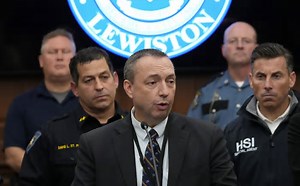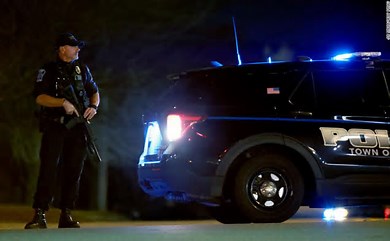Maine earned an F on the GIFFORDS Annual Gun Law Scorecard.
Maine’s lack of basic gun safety laws puts its residents at grave risk, and lawmakers owe it to their communities to stand up to this crisis.

Maine passed a reckless permitless carry law in 2015 that allows residents to carry loaded, concealed handguns in public without a permit, background check, or safety training. Maine also supplied crime guns to other states at the 29th highest rate among the states. Maine exported crime guns at more than six times the rate at which it imported crime guns from other states.
What Maine Is Missing
Extreme risk protection orders (red flag law)
Universal background checks
Gun owner licensing
Most domestic violence gun laws
Assault weapon restrictions
Large capacity magazine ban
Waiting periods
Concealed carry permit
Open carry regulations
What about Maine’s “Yellow Flag Law”?

In 2019, Maine passed something known in the state as a “Yellow Flag Law.” Under this law, when an individual is taken into protective custody, a medical practitioner is required to assess whether the individual presents “a likelihood of foreseeable harm.” That assessment is then provided to law enforcement, and, if endorsed by a judge, results in a temporary restriction that prevents the individual from possessing or acquiring a firearm. (The law was rarely used until the state allowed medical opinions via telehealth in October of 2022.)
Maine’s “Yellow Flag Law” has been criticized because the cumbersome medical practitioner requirement has rendered it unusable at times when it is critically needed. The compromise that led to that provision was criticized by the Maine Hospital Association and others during the legislative process. The law also focuses the risk of gun violence on people with mental illness who are much more likely to be the victims of gun violence than the perpetrators.

Important Facts to Note
During the 10-year period the federal assault weapons and large capacity magazine ban was in effect, mass shooting fatalities were 70% less likely to occur compared to the periods before and after the ban.
Studies show that the large majority of people with mental illness do not engage in violence against others, and that most violent behavior is due to factors other than mental illness.
When compared to other high-income countries, the US has comparable rates of mental illness, but we do have a gun homicide rate that is 25 times higher than our peer nations, as well as a higher rate of mass shootings. In other words, American gun violence is not the result of mental illness.
Psychiatrists and psychologists have noted that because many people with mental illness will never become violent, using mental health diagnoses to predict mass shootings is nearly impossible.
